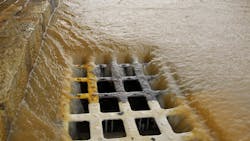Lowell, Massachusetts consent decree requires sewage system upgrades
The U.S. EPA announced that it reached a settlement agreement with the City of Lowell, Massachusetts, requiring the city to reduce sewage discharges into the Merrimack River and pay $200,000 for past violations.
A portion of Lowell’s wastewater collection system consists of sewers that convey sanitary sewage and stormwater runoff in a single pipe. During wet weather, EPA syas that untreated combined sewage is discharged through combined sewer overflow (CSO) outfalls to the Merrimack River and its tributaries, including Beaver Brook and the Concord River.
The City of Lowell reached the settlement agreement with EPA, the Justice Department and the Commonwealth of Massachusetts.
The Merrimack River is a drinking water source for several downstream communities. The agreement’s consent decree requires work to separate wastewater and stormwater, which will minimize the number of times untreated sewage is released into nearby waters.
Lowell will also implement a program to detect and eliminate illicit connections that discharge wastewater to the city’s stormwater system thereby reducing pollution in stormwater that flows into local streams and rivers. Lowell must also establish and implement city ordinances to help prevent stormwater runoff from construction and post construction sites.
The total cost to update the sewer system has been estimated at approximately $195 million.
This consent decree was the result of a joint enforcement action brought by the Justice Department on behalf of the EPA, and the Massachusetts Attorney General’s Office, on behalf of the Massachusetts Department of Environmental Protection.
“For far too long the city of Lowell, Massachusetts has failed to protect the communities that rely on the Merrimack River and other water sources for their drinking water,” said Assistant Administrator David M. Uhlmann of EPA’s Office of Enforcement and Compliance Assurance. “Today’s settlement demonstrates EPA’s commitment to ensure cities and towns meet their obligations under the Clean Water Act to prevent the overflow of sewage, pollutants, and debris into our nation’s waterways.”
Lowell owns and, through the Lowell Regional Wastewater Utility, operates the Duck Island Clean Water Facility, a 32 million gallon per day secondary wastewater treatment facility that discharges to the Merrimack River. The treatment facility treats wastewater not only from Lowell but also from the Towns of Chelmsford, Dracut, Tewksbury and Tyngsboro, Massachusetts.
Lowell had previously signed a consent decree with the federal government and the Commonwealth of Massachusetts in 1988 to address its illegal CSO discharges. While several interim actions have taken place, Lowell has not yet fully complied with the federal and state environmental statutes. More information on EPA’s efforts to address water quality issues can be found on the agency’s Merrimack River website.
A copy of the consent decree will be available on the Justice Department’s website.
